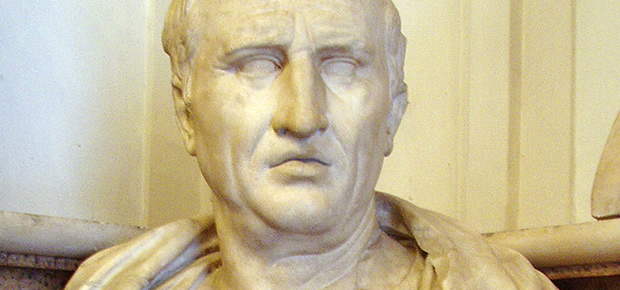
2.3.2 Cicerone
Born in Arpino 106 a.C. from a wealthy family but not aristocratic, completes his course of studies in Rome, acquiring legal education, rhetoric and philosophical, in order to devote himself to politics. And so it comes into contact with Greek philosophy. In fact, after the Mithridatic War, nell’88 a.C., some philosophers took refuge in Rome, arousing interest and curiosity in young philosophy. In this period Cicero has the opportunity to listen to the teachings of the Phaedrus, Epicurean philosopher on which he will express a positive opinion. Also, hosted in his home, according to a widespread custom among the Romans captured, Diodotus the Stoic, from whom he learned the dialectic, Philo of Larissa and attend to the teaching of which will be linked to all the rest of life. He also meets the Stoic Posidonius which is located in an embassy to Rome and that he will have the opportunity to listen to Rhodes during his study trip. From 79 to the 77 a.C. he went to Athens to attend classes dell'epicureo Zeno of Sidon and of Antiochus of Ascalon, and also in Asia Minor and Rhodes, to follow the lessons of Apollonius Molon, of which you profess student, acquiring a good education in rhetoric and philosophy.
Cicero has read and studied the Dialogues Plato (427-347 a.C.) and knows the published works of Aristotle (384-322 a.C.), Having also read many works of earlier philosophers. Aristotle is a model for Cicero especially the dialectical methodology and the art of rhetoric which he traces to the Academy as well as the Peripato. Cicero aspires to learn the techniques of exposure of the topics, essential for political life, attending the lectures of Philo of Larissa. Since the certain knowledge is extremely difficult to achieve or is not attainable, Philo believed that we were to adhere to what is likely, or persuasive. It may therefore be provisionally accept any point of view, but the temporary nature of opinions requires that they be subjected to critical, arguing the pros and cons. Cicero considers the foundation of this technique argumentative rhetoric but also of philosophical. Plato, then, Cicero represents the sum authorities, as is clear from many statements in his works. In De Oratore remembers reading carefully the Gorgia when was ad Atene, and also has also translated the Protagoras and the I am afraid. From his works it is clear that his main interest is to integrate philosophy with politics and rhetoric.
Mimicking the form of a dialogue of Plato's works, Cicero writes De re public and the In legibus, the securities of which echo those of two Platonic dialogues but that their contents are significantly more political works of Cicero Roman.
In De re public he proposes to merge tradition and Roman culture with Greek philosophy, in order to prove that the Roman constitution, as it has been elaborated by higher, is by far the best. Despite his interest in philosophy, Cicero devotes only the last few years, from 46 to the 44 a.C., the drafting of the philosophical works, just when he is forced to abandon the political commitment under the dictatorship of Caesar. His pride is to make available to the Romans philosophical works written in Latin and not in greek.
Among the philosophical dialogues must include the Cato Maior and the LAELIUS dealing with ethical issues of old age and friendship. He also claims membership in the philosophy of his three most important works rhetorical: the De oratore, the Brutus e l’Orator.
Cicero is well aware of the importance of the choice of words when you have to translate into another language a philosophical concept. La lingua latina, despite being very rich, not always have the technical terms can make the meaning of the Greeks. Then he fills this gap by coining new words that are understandable to those who speak Latin. In proposing to the Romans in Greek philosophy, he makes use of an equivalent term and less technical than greek, or a paraphrase to make the meaning of a single Greek word. Many terms coined by Cicero in Latin, quality, probability, Perception, highlight, indifferent, Moral, have established themselves in philosophical language and mark their history.




